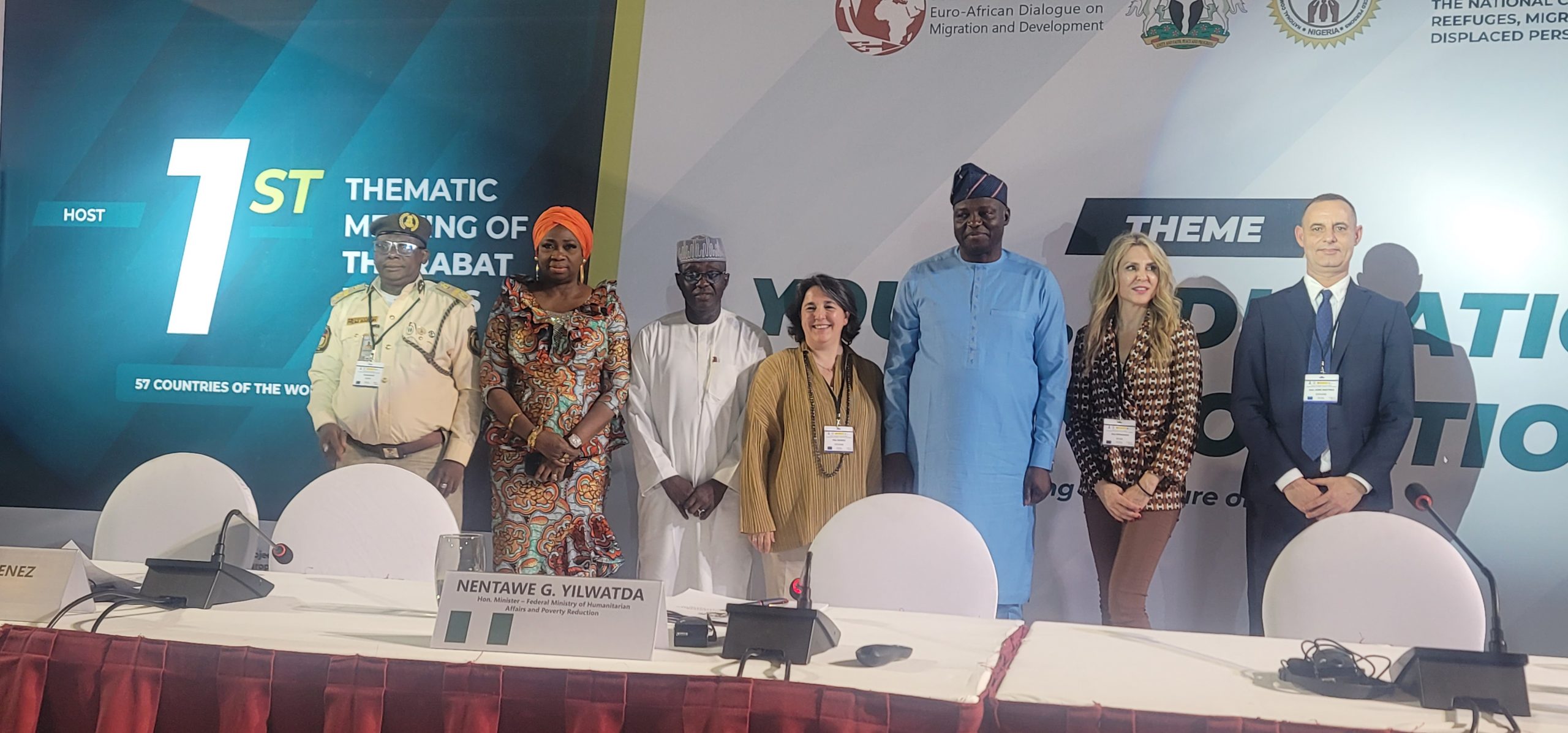News
Nigeria Pledges Support for Youth Development via Education, Innovation At Rabat Procesd Meeting

By Joel Ajayi
The Federal Government has reaffirmed its commitment to unlocking the potential of Nigerian youth and driving a better future through education, innovation, and empowerment—particularly for women.
Speaking at the end of a two-day extensive dialogue involving over 100 delegates from 57 member countries in Abuja, the Minister of Humanitarian Affairs and Poverty Reduction, Prof. Nentawe Yilwatda, emphasized the need for stronger collaboration to address the root causes of irregular migration and to build a future driven by youth empowerment through innovation and education.
The meeting marked the first thematic session of the Rabat Process under Nigeria and Spain’s joint chairmanship, a key Euro-African platform for dialogue on migration and development. Nigeria assumed the chairmanship in January 2025 and will pilot the process throughout the year.
The theme of the meeting was: “Youth, Innovation, and Education – Driving the Future of Migration.”
According to Prof. Yilwatda,
“We have collectively explored how youth, innovation, and education are not just policy themes but the very engines driving a sustainable migration system.
“We also confronted some hard truths: that migration is increasingly shaped by conflict, climate change, and economic disparities. While over 80% of migration remains regular, the global narrative often casts it in the language of fear. Many young people today feel their only path to opportunity lies elsewhere. But here in Abuja, we imagined a different story.
“A story where migration is safe, legal, dignified, and voluntary. A story where skills are shared—not lost—and where our youth are not fleeing from hardship, but moving toward purpose.”
He stressed the government’s dedication to promoting youth-centered policies that prioritize skills, mobility, and dignity, while also advancing innovation in migration governance, especially in areas like skill recognition.
He called for deeper partnerships within the Rabat Process network—from North and West Africa to Europe.
“We cannot do it alone. The future we seek demands bold partnerships,” the Minister said.
“To our European partners, we invite you to invest more in mobility pathways and joint innovations that empower rather than exclude. To development partners and the private sector, we urge support for skill-building programs that connect education with employment—especially in fragile and climate-affected regions. And to our African neighbors, let us build shared frameworks that recognize qualifications, retain talent, and create positive migration pathways. Migration should never be born out of despair.”
He concluded with a powerful message: “Let us shift from talk to action, from policy to practice. Let us show the world that migration, at its best, is a celebration of what we can build together—not a fear of the unknown.”
Also speaking at the event, Pilar Jimenez, Co-Chair of the Rabat Process and representative of Spain’s Migration Affairs, highlighted that youth are central to the future and must be invested in accordingly.
“Over these two days, we have exchanged ideas on how to unlock the power of youth through education and innovation. We’ve emphasized the untapped African talent that must be harnessed,” she said.
Jimenez noted the significance of youth participation in this year’s session and called for the co-creation of more inclusive spaces for dialogue.
“This meeting in Abuja has demonstrated that, nearly 20 years on, the Rabat Process is more relevant and necessary than ever—especially with the first direct involvement of youth in the process. We will continue to find sustainable ways to include young voices.”
A Nigerian youth delegate underscored their role in shaping the future: “We are not just part of the solution—we are the solution. We are the drivers of the future, and that future begins now.”
.
News
Amb Lion Ogorry Files Landmark Lawsuit Against Sahara Reporters, Sowore For Misleading and Malicious Publication Endangering National Security

Ambassador Adebayo Lion Ogorry, a renowned public advocacy practitioner and activist, today announced the filing of a high-profile lawsuit against Sahara Reporters Ltd. and its publisher, Omoyele Sowore, in the High Court of the Federal Capital Territory, Abuja.
The suit, numbered FCT/HC/CV/4767/2025, accuses the defendants of publishing a false, malicious, and reckless article that violates Nigeria’s Constitution, the Cybercrimes (Prohibition, Prevention, Etc.) Act 2015, and other laws protecting public discourse, national security, and public order.
The originating summons, filed on November 24, 2025, stems from a Sahara Reporters article titled
“EXCLUSIVE: How Tinubu’s Defence Minister Matawalle Maintains Contact With Bandit Leaders, Ordered Them To Compel Communities To Vote For APC—Former Aide,” published on November 19, 2025.
Ambassador Ogorry alleges that the publication contains grave, unfounded accusations against the Honourable Minister of State for Defence, Dr. Bello Matawalle, claiming he maintains illicit contacts with bandit leaders, orders communities to vote for the All Progressives Congress (APC), and engages in activities that undermine counter-terrorism efforts.
These claims, according to the suit, are not only false but also fabricated to incite alarm, hatred, and ill-will, while endangering national security and public safety.
In his affidavit supporting the summons, Ambassador Ogorry, a Nigerian citizen and resident of Abuja with a long-standing commitment to public order and lawful civic discourse, emphasized that the article was disseminated widely across Sahara Reporters’ website, social media channels, X.com (Twitter) account, Facebook pages, WhatsApp broadcasts, and other platforms. He described the publication as a blatant violation of Section 39(3)(a) of the 1999 Constitution (as amended), which prohibits speech that endangers public safety, national security, and public order. Furthermore, it contravenes Sections 24(1)(a) & (b) of the Cybercrimes Act 2015 by disseminating false, misleading, and harmful information capable of causing alarm or ill-will.
“The defendants’ reckless actions have not only tarnished the reputation of a dedicated public servant but have also compromised ongoing military operations against banditry and terrorism in Nigeria’s North-West region,” said Ambassador Ogorry. “This publication promotes distrust, exposes the Minister to risks, and undermines the morale of our armed forces engaged in counter-terrorism. It is a direct assault on our national security and the freedom of expression that must be balanced with responsibility.”
The lawsuit seeks the following reliefs from the court:
– A declaration that the publication is false, misleading, malicious, and not protected speech under Section 39(1) of the Constitution (as amended).
– A declaration that it falls within restricted speech under Section 39(3)(a), endangering public safety, national security, and public order.
– A declaration that it violates Sections 24(1)(a) & (b) of the Cybercrimes Act 2015 by prohibiting false, harmful, or misleading information.
– AN ORDER OF INJUNCTION restraining the Defendants, their agents, or privies from further publishing, distributing, circulating, or causing to be circulated the said false publication or any other malicious publication especially as it relates to and against the person of Defence Minister, Dr. Matawalle.
– An order directing the defendants to issue a public retraction of the publication and publish a full apology on their website and social media channels for 14 consecutive days.
– General and exemplary damages of N10,000,000,000 (Ten Billion Naira) for the frivolous, false, and malicious publication geared toward endangering public safety, national security, and public order.
Ambassador Ogorry highlighted that the article, based on unverified claims from an alleged “former senior aide,” lacks any official record or evidence, demonstrating the defendants’ disregard for truth and ethical journalism. He urged the court to address this as a matter of urgent national importance, citing precedents such as President F.R.N. v. ISA (2017) and Guardian Newspapers v. AIEH (2011), which affirm that freedom of expression does not protect reckless publications that threaten security.
“This lawsuit is not just about correcting a falsehood; it’s about safeguarding Nigeria’s democracy, protecting public officials from baseless attacks, and ensuring media accountability,” Ambassador Ogorry added. “Sahara Reporters and Omoyele Sowore must be held responsible for their role in spreading dangerous misinformation that could fuel terrorism and disrupt public order.”
The case is set for hearing in the Abuja Judicial Division, and Ambassador Ogorry expressed confidence in the judiciary’s ability to uphold justice and constitutional principles.
About Ambassador Adebayo Lion Ogorry
Ambassador Adebayo Lion Ogorry is a public advocacy practitioner, activist, and Nigerian citizen dedicated to promoting national security, public order, and lawful civic discourse. With a focus on protecting public discourse from malicious interference, he advocates for responsible journalism and governance.
-

 Featured6 years ago
Featured6 years agoLampard Names New Chelsea Manager
-

 Featured6 years ago
Featured6 years agoFG To Extends Lockdown In FCT, Lagos Ogun states For 7days
-

 Featured6 years ago
Featured6 years agoChildren Custody: Court Adjourns Mike Ezuruonye, Wife’s Case To April 7
-

 Featured6 years ago
Featured6 years agoNYSC Dismisses Report Of DG’s Plan To Islamize Benue Orientation Camp
-

 Featured4 years ago
Featured4 years agoTransfer Saga: How Mikel Obi Refused to compensate me After I Linked Him Worth $4m Deal In Kuwait SC – Okafor
-
Sports3 years ago
TINUBU LAMBAST DELE MOMODU
-

 News11 months ago
News11 months agoZulu to Super Eagles B team, President Tinubu is happy with you
-
Featured6 years ago
Board urges FG to establish one-stop rehabilitation centres in 6 geopolitical zones
